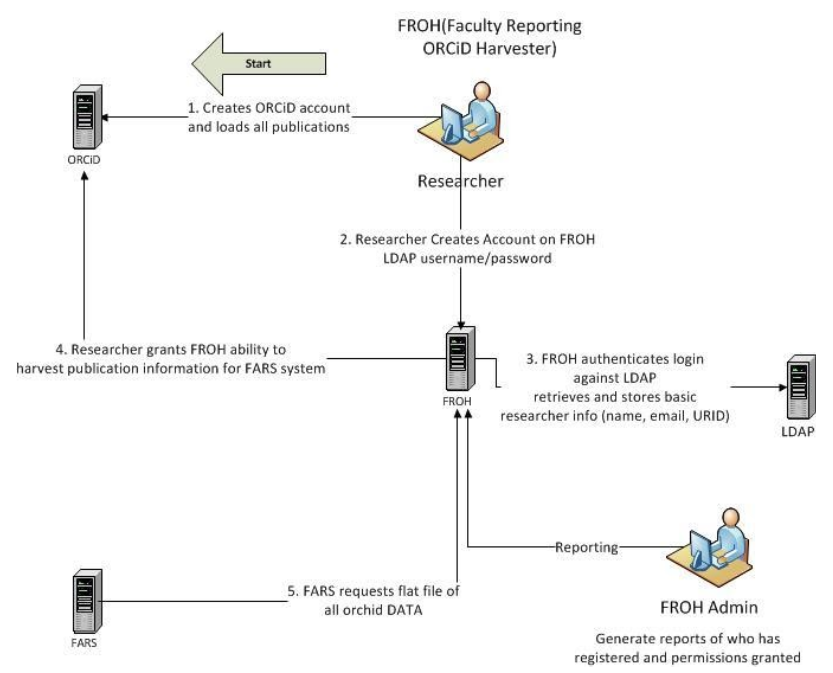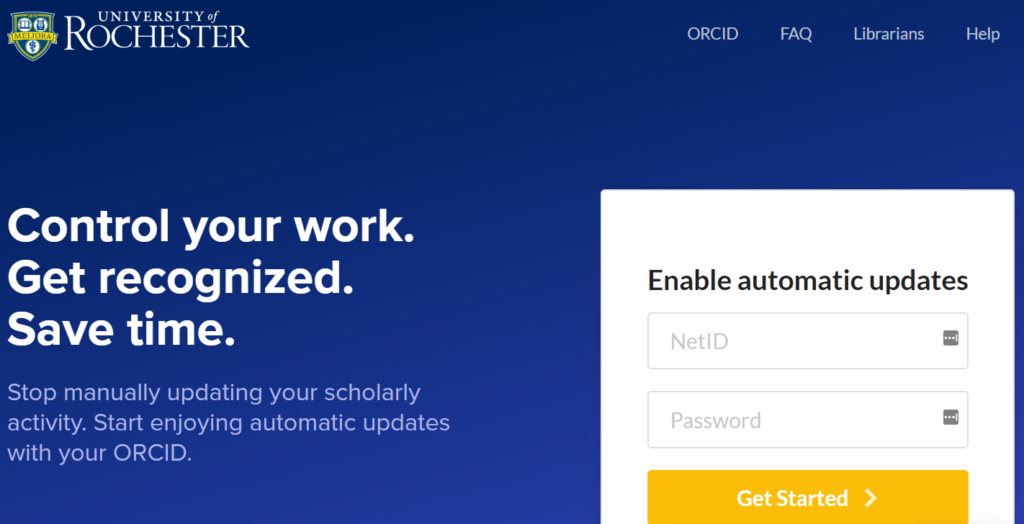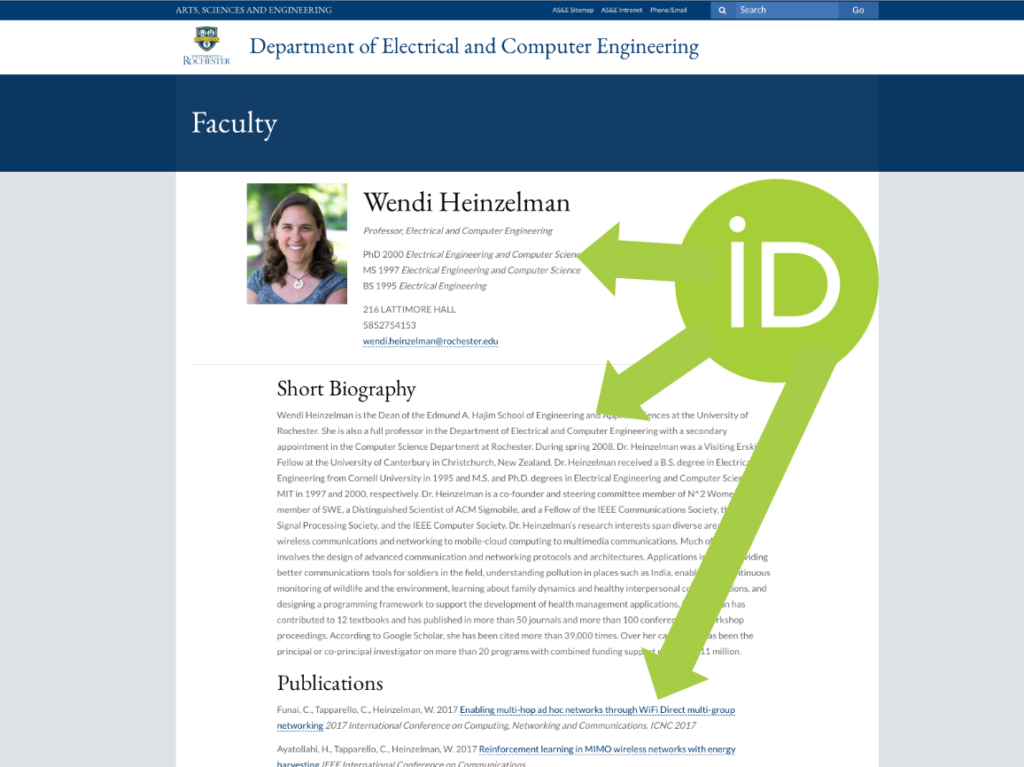
The University of Rochester in New York became an ORCID member organization in 2017 initially through the NorthEast Research Libraries (NERL) consortium, prior to joining through the ORCID US Community consortium in 2018. This blog post is based on presentations by Lauren Di Monte, Assistant Dean, Digital & Research Strategies at University of Rochester River Campus Libraries, at the 2019 Digital Library Federation (DLF) Forum, and by Sarah Pugachev, Director of Research Initiatives at the University of Rochester River Campus Libraries, for the ORCID US Community Showcase Webinar #5 on June 4, 2020. Many thanks to Lauren and Sarah for sharing their experience!
The University of Rochester River Campus Libraries’ Research Initiatives department has been leading the campus ORCID initiative, given their charge of demonstrating impact of research enterprise and library services/programs, benchmarking research performance, providing data to inform decision making around research strategies and partnerships, and developing tools and services to support broader research goals. In support of these activities and to strengthen centralized research services, the university became an ORCID member in order to use ORCID to:
- Distinguish between researchers to ensure accurate name disambiguation and representation
- Ensure clean and accurate records about researchers and their activities as individuals as well as aggregate representation of the institution at large
- Improve the efficiency of workflows for research activity reporting, to save time for researchers, staff, and administrators
- Help researchers meet ORCID requirements set by publishers and funders
Partnering with Internal Stakeholders
The University of Rochester River Campus Libraries identified multiple internal stakeholders within units across campus as partners for strategic institutional ORCID adoption, including institutional leadership, deans and directors, departmental administrators and support staff, individual researchers, domain experts, IT and infrastructure units, and sponsored projects. For the stakeholders that were not already aware of ORCID and the potential benefits of ORCID, leaders in the library approached conversations about ORCID by focusing on each stakeholders’ needs and strengths, highlighting the possibility of using ORCID as a way to build partnerships across departments and improve workflows.
The Libraries took the lead in helping other internal units understand ORCID, offered training and outreach to departmental administrators, and worked with institutional administrators to develop policy and formalize the value of ORCID for both the institution and its affiliated researchers. ORCID iDs are now a requirement for all graduate students submitting electronic theses and dissertations (ETDs), and in the fall of 2019, a letter from the Provost and Senior Vice President for Research, co-signed by the Vice Provost and Dean of University of Rochester Libraries and Vice Provost for Global Engagement, was sent to faculty encouraging all to get and use their ORCID iDs.
ORCID API Integration for Faculty Activity Reporting
The University of Rochester homegrown Faculty Advancement and Reporting System (FARS) was the first local system to be integrated with the ORCID member application programming interface (API). FARS is used to collect information from faculty about their teaching, research, and funding activities. Prior to the ORCID API integration, teaching information was imported from the campus learning management system (LMS), but faculty had to enter their research and funding activities manually, which was frustrating and time-consuming for both researchers and administrators. ORCID was identified as a way to mitigate the manual entry of data, allowing faculty to import their information from ORCID into FARS to save time and reduce administrative burden within the FARS reporting workflow.
As a new service, the University of Rochester team started by acknowledging the unknowns and potential risks for building the ORCID API integration, and thus took a lean, iterative approach. For example, researchers would not be required to use the ORCID integration, but it was expected that the time-saving aspects of importing data from ORCID into FARS would appeal to researchers and convince them to use the integration to their advantage. The team also set goals for the project, conducted reviews to identify missing information and new needs, and continued to check in with users to get feedback in order to enhance and improve the user experience.
The Faculty Reporting ORCID Harvester (FROH) was created to allow FARS to collect, or harvest, information from ORCID records to import into FARS via the ORCID API. With this ORCID integration in place, as long as faculty have their activities, funding, and works information populated in their ORCID records, they can connect their authenticated ORCID iD with FARS and import their information by clicking a button rather than re-typing all of their information over and over again each year. FARS imports authenticated ORCID iDs, all works information (including title, up to five contributors, journal title, and page numbers from BibTex), and funding information from ORCID, augmented with peer review information if available. The ORCID integration was first advertised to new faculty three years ago, and refinements are still being made, but faculty are increasingly using the integration to save time, with over 100 faculty using the feature so far just this year.

The Faculty Reporting ORCID Harvester (FROH) allows faculty to save time and reduce administrative burden by importing data from their ORCID record into the Faculty Advancement and Reporting System (FARS)
The University of Rochester has a central ORCID connection page to make it as easy as possible for researchers to learn about ORCID and connect their ORCID iD with the University of Rochester. The Libraries ORCID team is planning an ORCID API integration with their homegrown institutional repository (IR), in order to streamline the requirement for ORCID iDs on ETD submissions. Additionally, the Libraries’ leadership in the ORCID FARS project opened the door for collaboration with other campus units on a University-wide project to select and implement an online profile system for researchers, which will also be integrated with ORCID, however the project is currently on hold due to COVID-19.

The University of Rochester has a central ORCID connection page to make it as easy as possible for researchers to get information and connect their ORCID iD with the University of Rochester.

Once researchers have connected their ORCID iD with the University of Rochester, departmental websites can be populated with information directly from researchers’ ORCID records.
ORCID Outreach and Education
To let researchers know about ORCID and the system integrations available on campus, outreach efforts started small and have grown, starting with outreach librarians as the first point of contact. Services were then developed primarily around publisher and funder requirements, such as pop-up services to encourage researchers to designate librarians as trusted individuals to help researchers populate their data in ORCID, for which over 100 people participated this year, many of whom did not already have an ORCID iD.
Librarians have also been focused on embedding ORCID education and activities in related workshops on topics such as scholarly identity, and emphasizing ORCID as part of the broader research and scholarly communication ecosystem. They are also working on targeting ORCID outreach to different audiences, thinking about what messages about the benefits of ORCID would resonate with graduate students as opposed to tenured faculty, and researchers in different disciplines, for example.
Lessons Learned
For other institutions thinking about institutional ORCID initiatives, the experience of ORCID adoption at University of Rochester has yielded a number of lessons learned and advice to be shared, including:
- Start small, think long term, and plan for iterative progress.
- Think about wider campus system infrastructure and possibilities for how data could flow across various systems.
- Understand the needs of different groups of researchers (for example: humanities and arts faculty vs. sciences; students vs. faculty) as well as different internal stakeholder units and how they might benefit from ORCID.
- Identify incentives that can be provided locally to ease the path to ORCID adoption.
- Recognize that not everyone will be on-board with ORCID (at least at first) and that’s ok; ORCID represents a paradigm shift from manual, repetitive workflows to more automated, efficient, and streamlined workflows for tracking and reporting researcher activities. It will take some time to fully make this shift.
- Establish local staff as ORCID experts so researchers and other staff know who they can go to to get more information about ORCID down the line. ORCID expertise within the library can help to reinforce the library as a critical campus partner, and ORCID serves as an area of common interest that can provide a foundation of cross-campus partnerships that can extend to a variety of other projects.
If you have questions about the University of Rochester ORCID case study, please contact orcidus@lyrasis.org.
